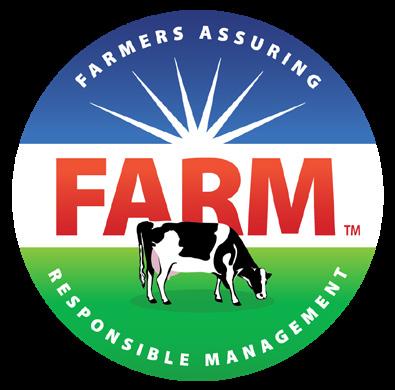




Celebrating 15 Years of Continuous Improvement
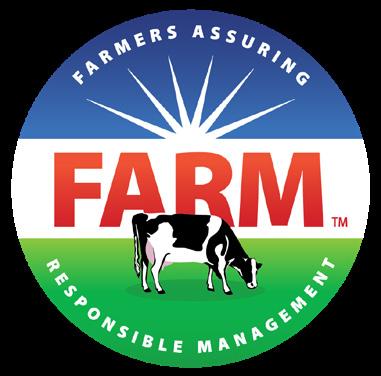
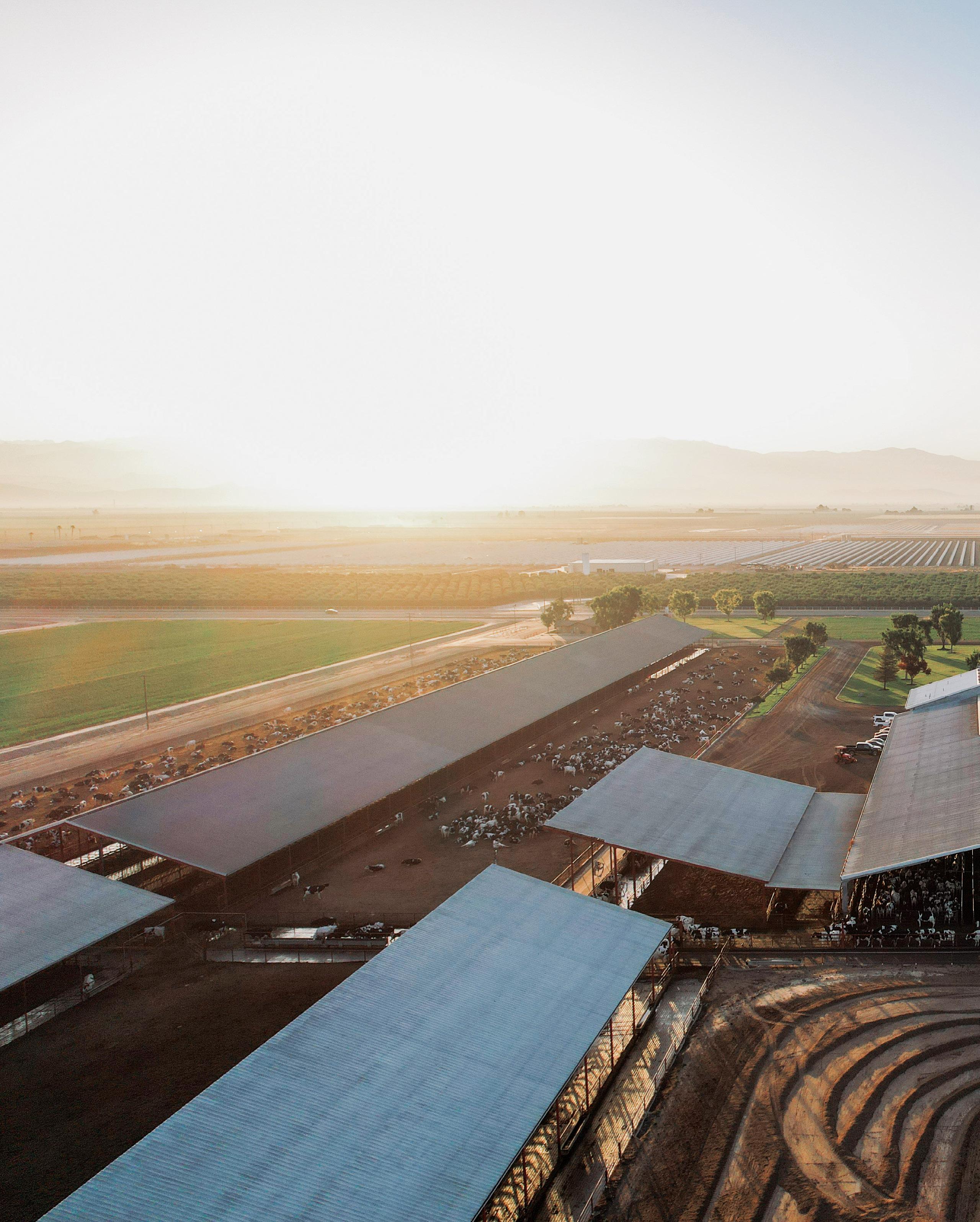
Consumers today are invested in making safe and sustainable choices as part of their daily diet. As science and technology develop, a demand for social responsibility grows and expectations for industry standards rise. Consumers care about their connection to food, how it’s produced and the people that produce it.
The National Dairy Farmers Assuring Responsible Management (FARM) Program strengthens the trust of everyone who makes dairy a part of their day by outlining the highest standards and best management practices when it comes to animal care, antibiotic stewardship, biosecurity, environmental stewardship and workforce development.
The FARM Program was created by the National Milk Producers Federation (NMPF) with support from Dairy Management Inc.™ (DMI) in 2009. Open to all dairy farms, milk processors and cooperatives, FARM helps ensure industry success by demonstrating to customers and consumers that U.S. dairy farmers are committed to producing the best milk with integrity. FARM provides comprehensive resources, expert guidance, and educational tools to support a culture of continuous improvement on-farm.


NMPF is the voice of dairy cooperatives at our nation’s capital. Its mission is to foster an economic and political climate in which dairy farmers, and the cooperatives they own, can thrive, and prosper. Success in doing so assures consumers of wholesome and nutritious dairy products at affordable prices. The FARM Program allows NMPF to show policymakers how the dairy industry employs a robust, standards-based approach to ensure excellence and continued improvement. Find out more at nmpf.org.
Dairy Management Inc.™ (DMI) is funded by America’s 26,000 dairy farmers, as well as dairy importers. Created to help increase sales and demand for dairy products, DMI and its related organizations work to increase demand for dairy through research, education and innovation, and to maintain confidence in dairy foods, farms and businesses. DMI manages National Dairy Council and the American Dairy Association, and founded the U.S. Dairy Export Council, and the Innovation Center for U.S. Dairy. Find out more at usdairy.com

ANIMAL
WINNER:
ANTIBIOTIC
ENVIRONMENTAL
Thank you for reading this year’s FARM Year in Review, which details how the program helped dairy farmers and the industry meet the many challenges that arose in the past year.
2024 witnessed the emergence of the H5N1 avian influenza virus in dairy cattle. It saw continued misinformation from anti-dairy activists who try to gain advantage by being untruthful about farmers. And it saw continued pressure worldwide for countries and companies to meet climate-related emissions targets. Each of these challenges touch a dairy farmer’s bottom line. And each of them were addressed by FARM, which over the past 15 years has established dairy as a global leader in areas consumers care about.
Thanks to industry foresight, FARM Biosecurity made sure dairy farmers weren’t starting from scratch in the H5N1 response. Thanks to FARM Animal Care guidance and world-leading best practices, the activists didn’t gain ground in their anti-dairy campaigns. And with new versions launched of FARM Animal Care and FARM Environmental Stewardship, along with FARM Workforce Development, dairy kept ahead of consumer and business concerns, showing the integrity of U.S. milk and encouraging consumer confidence.
Heading into 2025, FARM’s position is strong. And through our continued collaboration with Dairy Management Inc., which supports the program that we at NMPF administer, we’re looking forward to another year of forward-thinking dairy-farmer leadership. Thanks again for hearing what we have to say, and for supporting FARM in the past year and in the years to come.



Gregg Doud President and CEO, NMPF
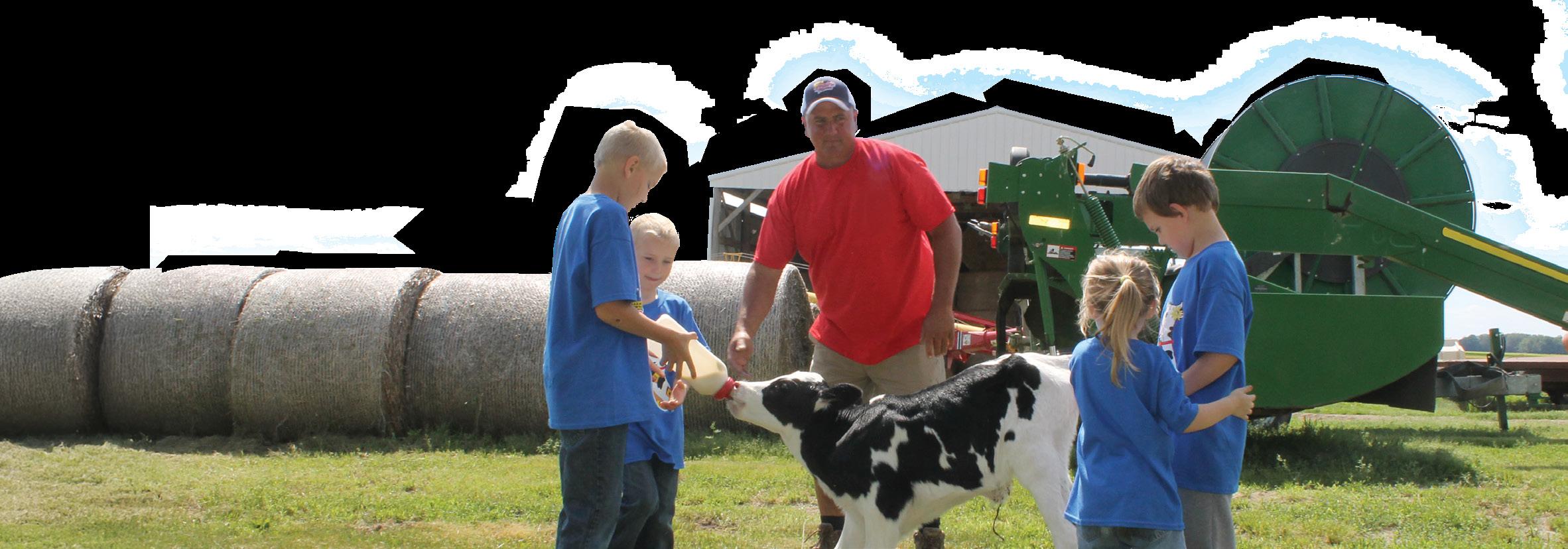
As we celebrate the 15th anniversary of the FARM Program, I am filled with immense pride and gratitude for the remarkable journey we have undertaken together.
Over the past decade and a half, the FARM Program has been core to promoting the hard work and dedication of farmers and their cooperatives and processors in animal care, antibiotic stewardship, biosecurity, environmental stewardship and workforce development.
Our collective success is a testament to the unwavering commitment of our dairy community who have enhanced the welfare of our animals, sustainability of the environment and the work and safety cultures for dairy employees, while strengthening consumer trust in the dairy products they enjoy every day.
Looking back, we see a legacy of innovation and collaboration. This year alone, the program released new versions for three out of five program pillars. FARM Animal Care Version 5 and Workforce Development Version 2 launched this summer, providing refinement and consistency in its respective evaluations. FARM Environmental Stewardship Version 3 launched this fall, incorporating the latest environmental science and technology with the Ruminant Fam Systems (RuFaS) model. A collective effort from dairy farmers and industry experts alongside of FARM Program staff made this all possible.
Our newest program area, FARM Biosecurity, led an industry wide effort as H5N1 threatened the industry since the end of March. The program pillar has equipped dairy farmers with tools to detect and defend against this new animal disease through resources, information sessions, trainings and guided discussions.
While I embark upon a new and exciting personal career journey, I have full trust that the program will remain steadfast in its mission to promote on-farm social responsibility. FARM has served as an amazing vehicle to share the good of dairy and I am confident that the next 15 years will hold even greater promise as FARM will inevitably continue to evolve and adapt to meet the challenges and opportunities ahead. But before we embrace the changes in 2025, let us reflect on our accomplishments and go back to where it all began.
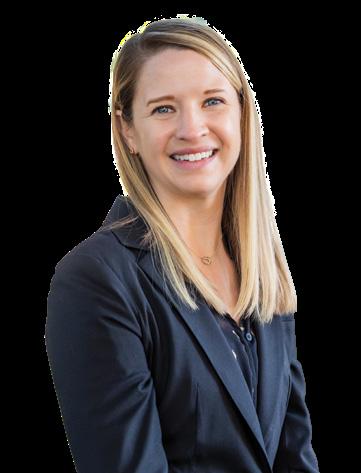
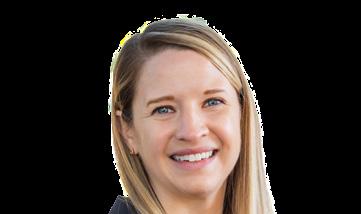

Executive Director, FARM
Antibiotic Stewardship
Animal Care
The FARM Program has supported dairy farmers in their mission of providing safe, wholesome milk with integrity for 15 years. This timeline reflects milestones and achievements as the Program adapted to industry needs and challenges. FARM encourages its participants to seek educational resources that follow the latest science and best management practices, fostering a culture of continuous improvement.
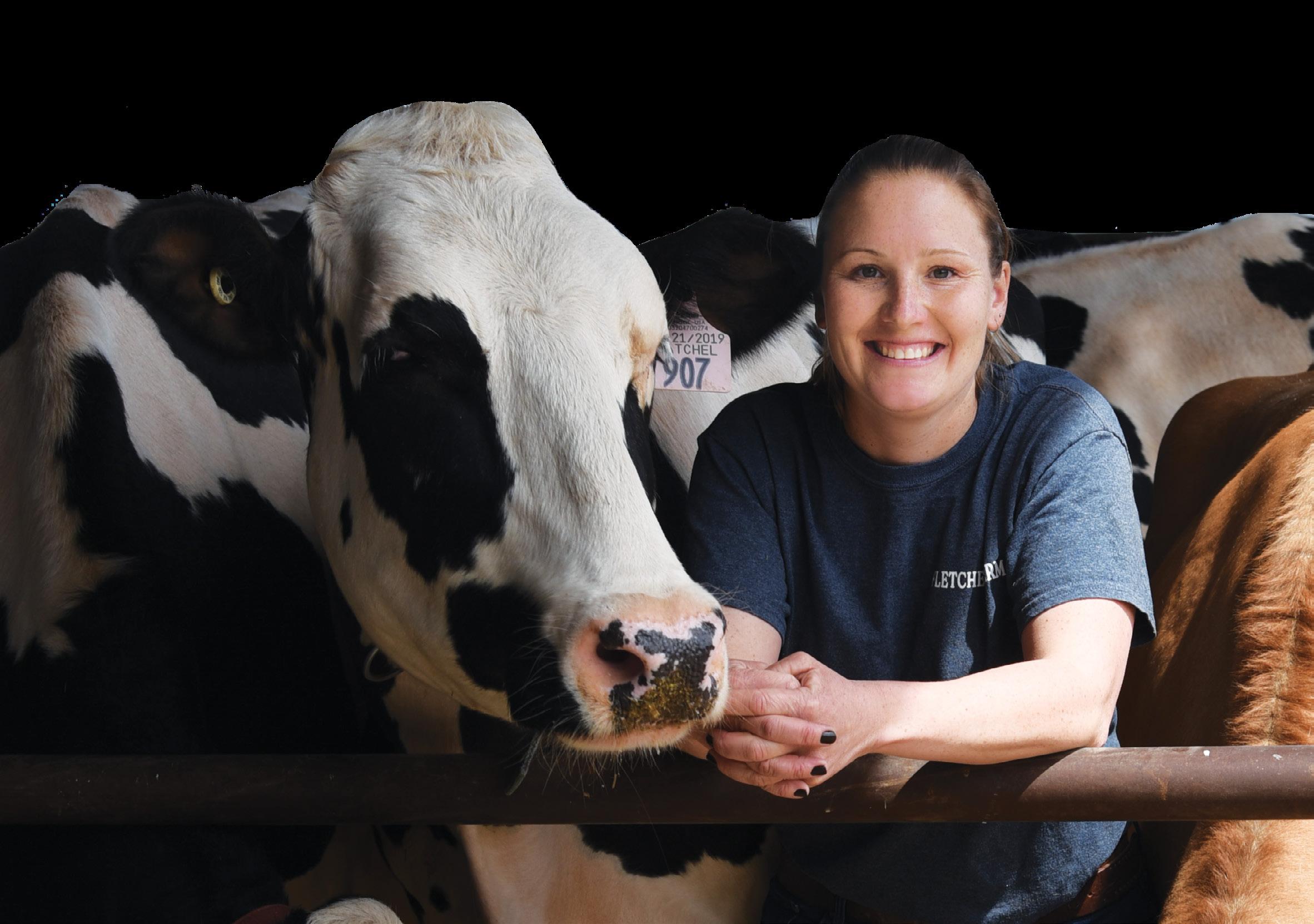
Animal Care
VERSION 3
ISO Certified International Organization for Standardization (ISO) Certification (2018–Present)
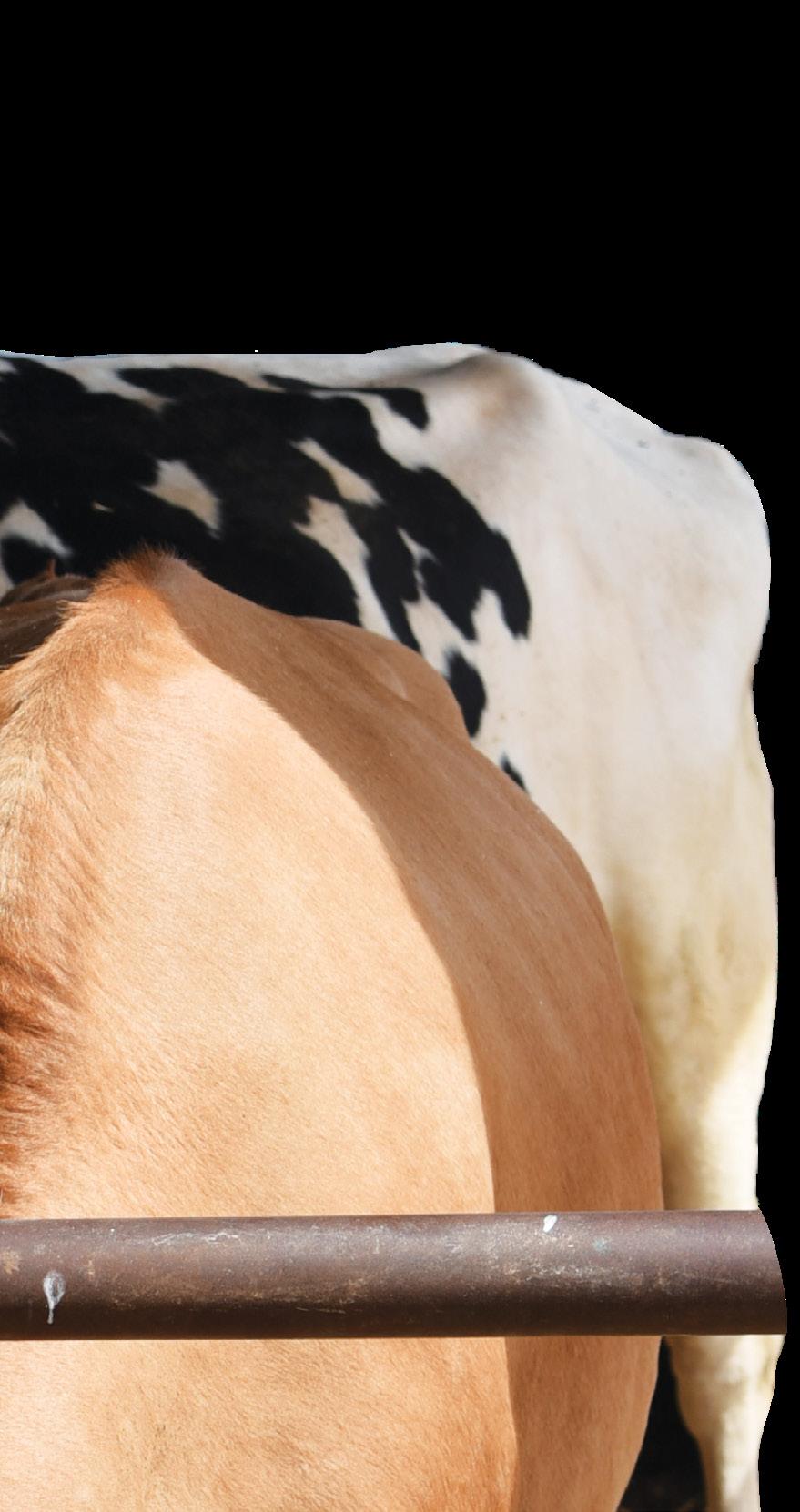
Animal Care
VERSION 4*
Environmental VERSION 2*
Biosecurity
VERSION 1
Workforce VERSION 1*
PAACO Certified Professional Animal Auditor Certification Organization (PAACO) Certification (2021–Present)
Animal Care
VERSION 5
*Indicates cycle extension for COVID-19 pandemic
First FARM Excellence Awards
Environmental VERSION 3
CCQA
Established
Workforce VERSION 2
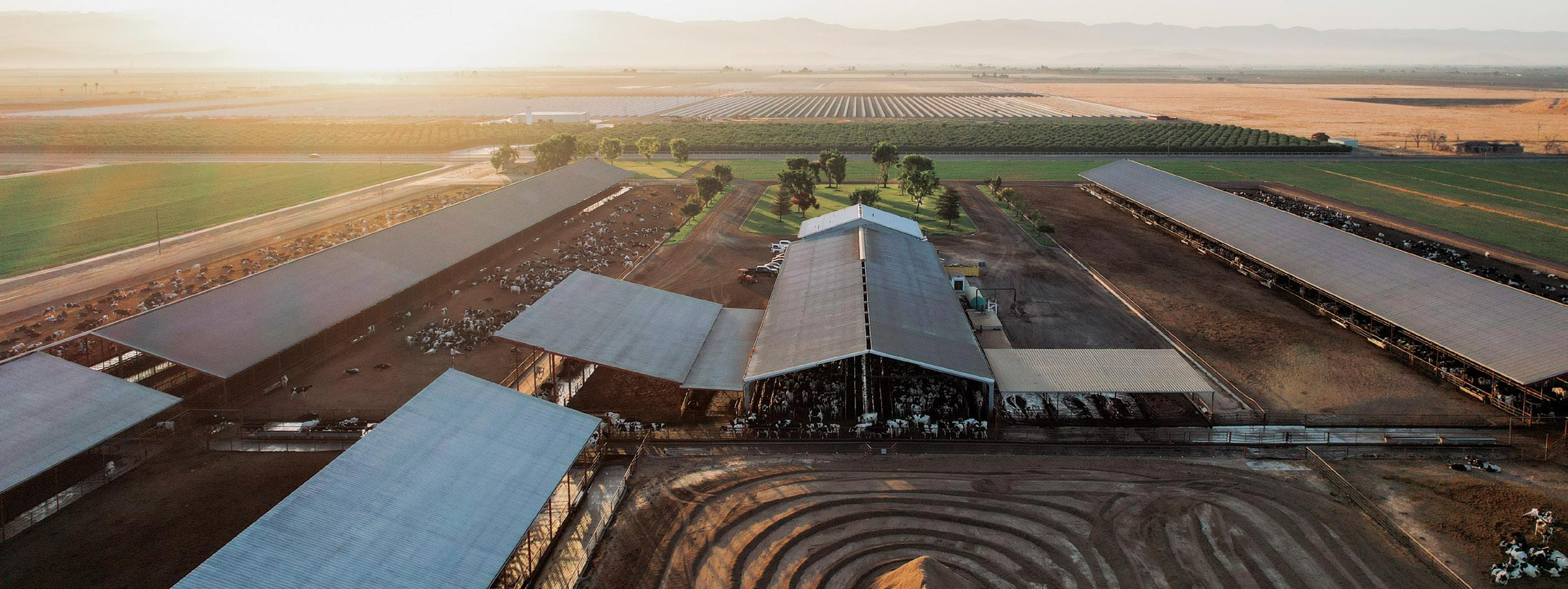
The FARM Animal Care Program amplifies dairy producers’ commitment to providing excellent care of their dairy cattle and producing safe, wholesome milk.
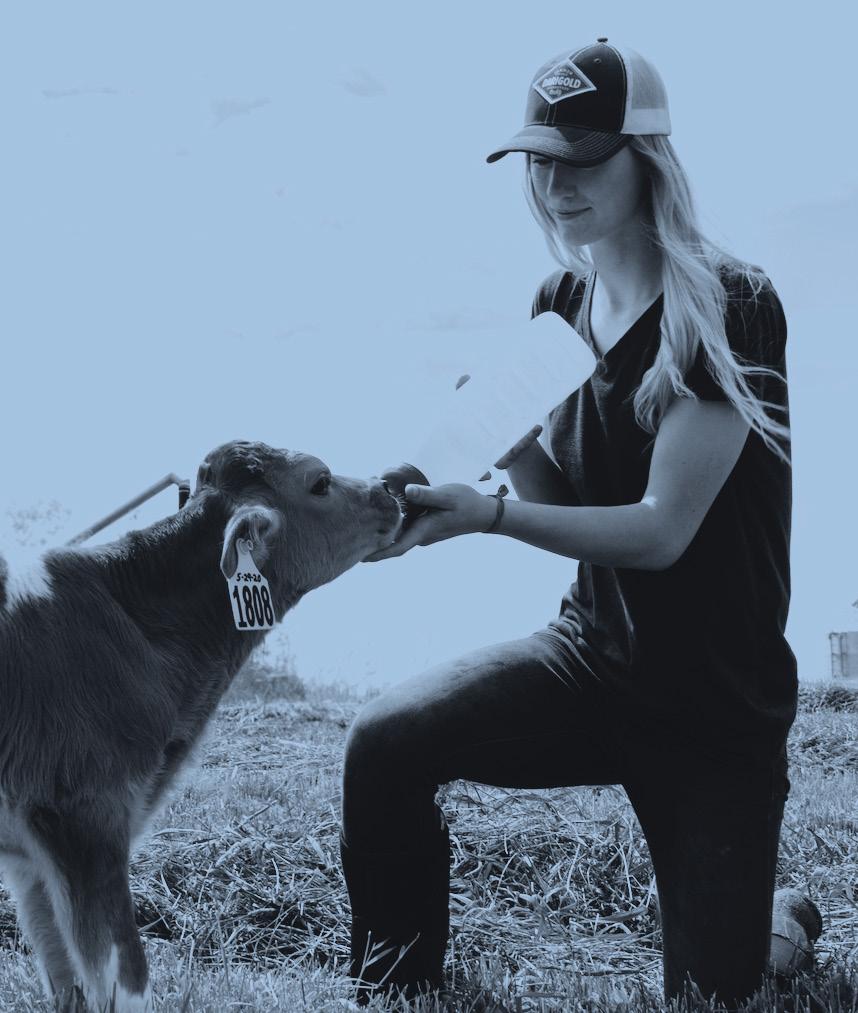
The program develops animal care standards that are science-and outcomes-based, and facility and size neutral, with evaluation areas used to verify excellent animal care.
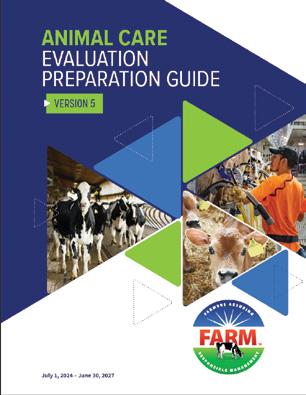
FARM Animal Care Version 5 was released in July, with refinements focusing on best practices for pre-weaned calf care including disbudding of calves and colostrum management. Clarification around euthanasia and fitness to transport standards were also included in the revision. The changes came after a two-year review period that included input from FARM’s Farmer Advisory Council and Animal Care Task Force, along with National Milk Producers Federation’s Animal Health and Well-Being Committee and Board of Directors.

The program distributed resources surrounding the new topics, such as informational one-pagers, posters, prep guides, manuals and more. Trainings also helped evaluators prepare for Version 5 with 378 evaluators certified in 2024.
The program develops animal care standards that are science-and outcomes-based, and facility and size neutral, with evaluation areas used to verify excellent animal care.
Requires that action is taken to meet the standard within a minimum of three (3) years or less as determined by the program participant. Failure to meet this standard within this allotted time frame will result in the facility being placed on “Conditional Certification” leading to “Conditional Decertification” if standards are not met after the designated time frame. A program participant will be delisted from FARM if they continue to procure milk from a “Conditionally Decertified” facility.
Requires that the standard is met within nine (9) months or less as determined by the program participant. Failure to meet these standards within this allotted timeframe will result in the facility being placed on “Conditional Certification” leading to “Conditional Decertification” if standards are not met after the designated timeframe. A program participant will be delisted from FARM if they continue to procure milk from a “Conditionally Decertified” facility.
The Calf Care & Quality Assurance (CCQA) program was developed in 2020 in partnership with the FARM Program, the National Cattleman’s Beef Association’s (NCBA) Beef Quality Assurance (BQA) program, the Veal Quality Assurance (VQA) program, and the Dairy Calf and Heifer Association (DCHA) to elevate U.S. calf raiser standards by uniting around key management practices. For more information, please visit ccqa.org.
2,793 Animal Care V5 Evaluations in 2024
378
Evaluators completed and passed certification course
42 New Evaluators certified
29% of evaluations generated one or more Continuous Improvement Plans (CIPs) Of those, the average number of CIPs was 1.4.
Trainings helped evaluators prepare for Version 5 with 378 evaluators certified in 2024.
71% of facilities had a valid, signed Veterinarian-Client-Patient Relationship (VCPR) form.
43% of evaluations generated one or more Mandatory Corrective Action Plans (MCAPs). Of those, the average number of MCAPs was 4.7.
34,222 Animal Care V4 Evaluations
40%
of evaluations generated one or more Continuous Improvement Plans (CIPs). Of those, the average number of CIPs was 3.
LISTEN
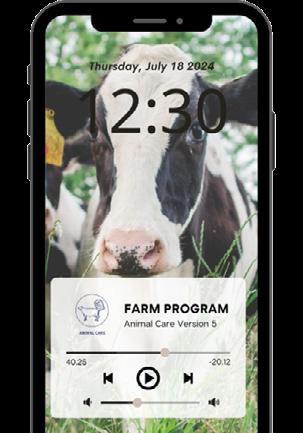
NMPF’s Senior Director of FARM Animal Care, Beverly Hampton Phifer, talked to Dairy Radio Now listeners about the new version implemented to the FARM Animal Care Program.
For more information, please visit https://www.nmpf.org/farm-programupdates-animal-care-standards/
71% of facilities had a valid, signed Veterinarian-Client-Patient Relationship (VCPR) form.
35% of evaluations generated one or more Mandatory Corrective Action Plans (MCAPs). Of those, the average number of MCAPs was 4.
The Animal Care Concern Protocol exists for participating farms as a risk mitigation tool or in a situation where credible evidence or allegations of concern for animal care is reported to the FARM Program. In this protocol, a thorough review of the allegation is completed by an ad hoc FARM committee. When evidence is deemed credible, a third-party audit of the alleged animal care issues at the farm is conducted to determine the validity of the evidence or allegations. In any animal care concern investigation, the hope is that the allegations or evidence are proven to be untrue. When an audit verifies evidence or allegations, the protocol requires the farm to take mandatory corrective action steps before FARM returns the farm to good standing and full certification in the Program.
Corrective action resolutions are verified through a follow-up audit. Only after successful completion and verification that the corrective action steps have been implemented is the farm reinstated to good standing with the FARM Program.
Locomotion
�� Establish benchmark for moderate lameness at 15% with associated Continuous Improvement Plan (CIP)
Disbudding
�� Elevate pain management standard for disbudding from Continuous Improvement Plan (CIP) to Mandatory Corrective Action Plan (MCAP)
�� Acknowledged only acceptable disbudding methods as Caustic Paste & Cautery
Calves
�� Refined how colostrum feeding standards are evaluated as meet quantity (10% birth weight), quality (visual, colostrometer, etc.) and timeliness (within 6 hours) guidelines; OR evidence of successful transfer of passive immunity
Continuing Education
�� Elevate family employee continuing education standard from Continuous Improvement Plan (CIP) to Mandatory Corrective Action Plan (MCAP)
Euthanasia
�� Addition of identifying primary & secondary individuals for euthanasia implementation
�� Protocol to outline how confirmation of death is performed
Program Implementation
�� Establish discovery process between FARM & co-op/ processor for farms that exceed animal observation benchmarks significantly
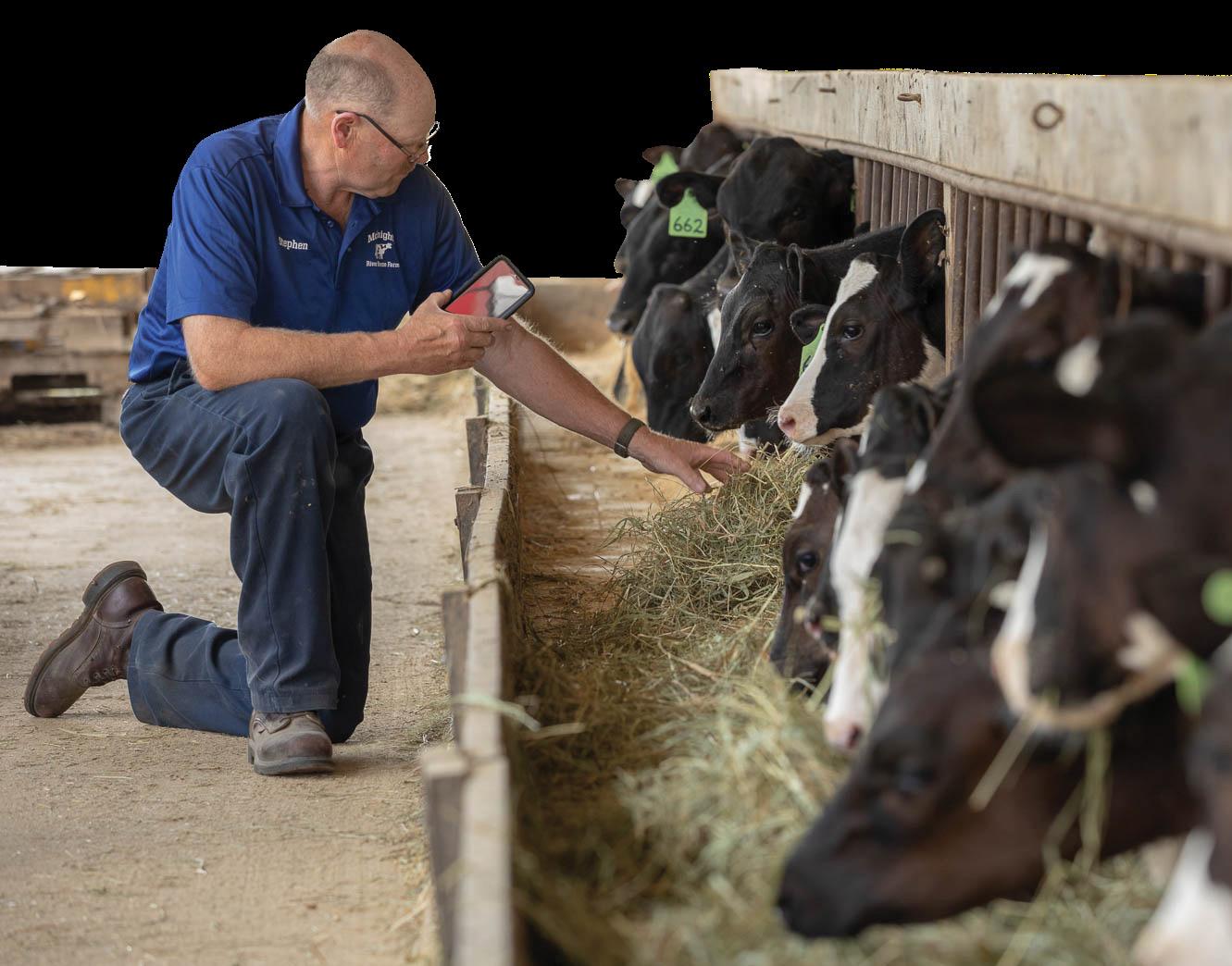
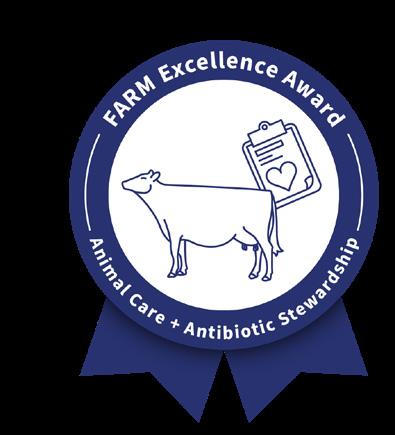
Carlson Dairy began in 1891 in Pennock, MN, with humble beginnings of milking eight cows in a small red barn. Fast forward to today, the dairy has multiple generations of Carlsons performing daily operations, milking roughly 2,000 cows. The Carlsons are members of First District Association.
After every FARM Animal Care evaluation, areas for improvement are addressed in a timely fashion. The farm ensures all employees have signed annual Cow Care Agreements and have signed training logs during the onboarding process for new employees. Posters for correct handling of calves, non-ambulatory cows and transporting animals can be found throughout the farm, in both English and Spanish, to ensure the correct and proper methods are followed.
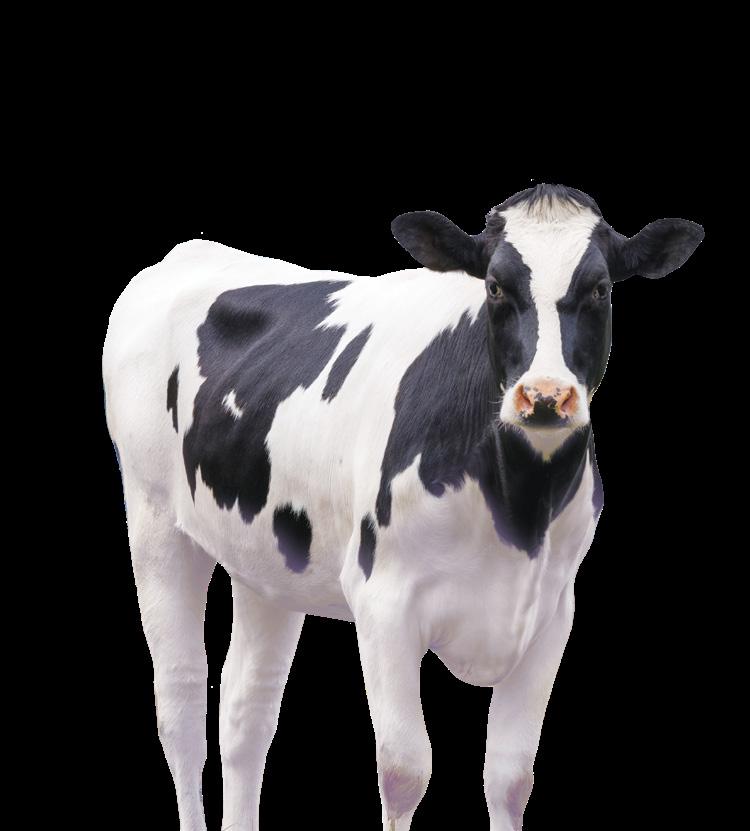
When it comes to the handling of antibiotics, Carlson Dairy works with its veterinarian clinic to ensure judicious and appropriate use. Carlson Dairy creates well-planned vaccination programs through its clinic to mitigate antibiotic use, starting with newborn calves to minimize future health risks. All treatments are logged in the animal health log and stored in the locked drug room. These efforts have paid off, keeping cows healthy and enhancing overall animal care.

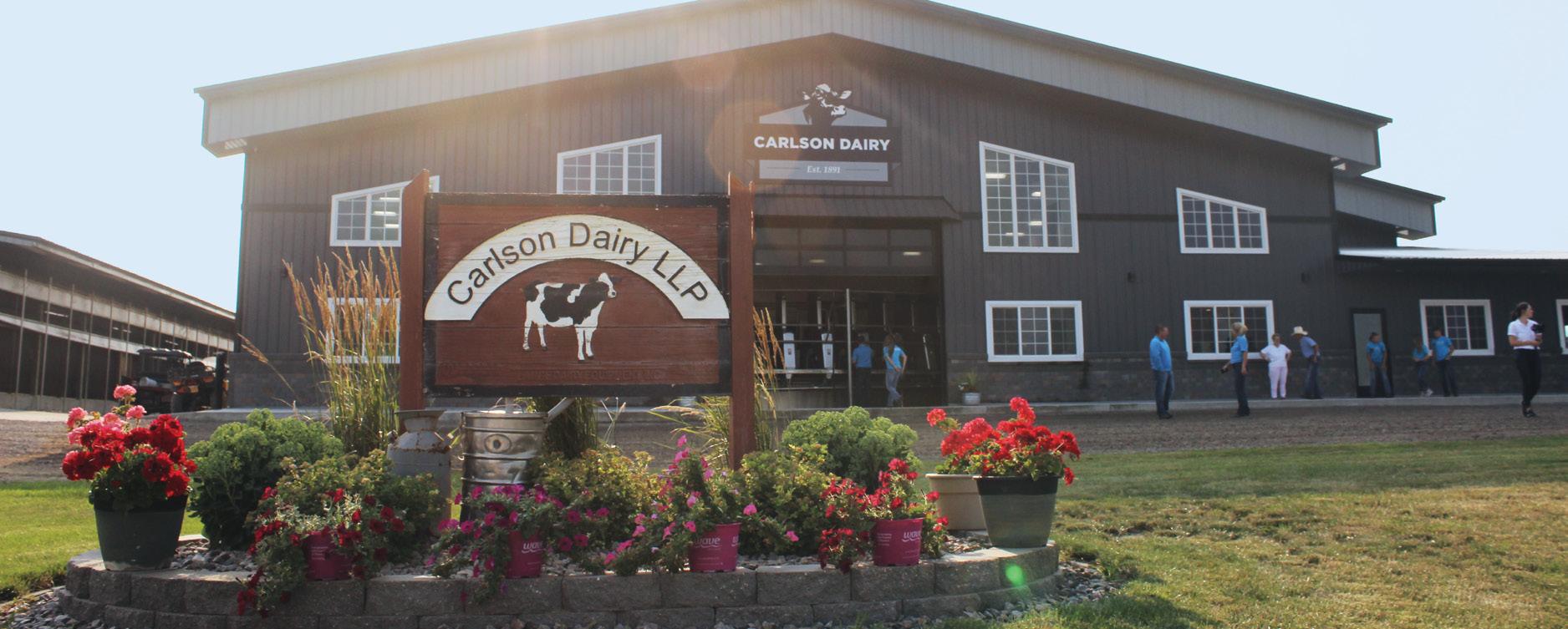
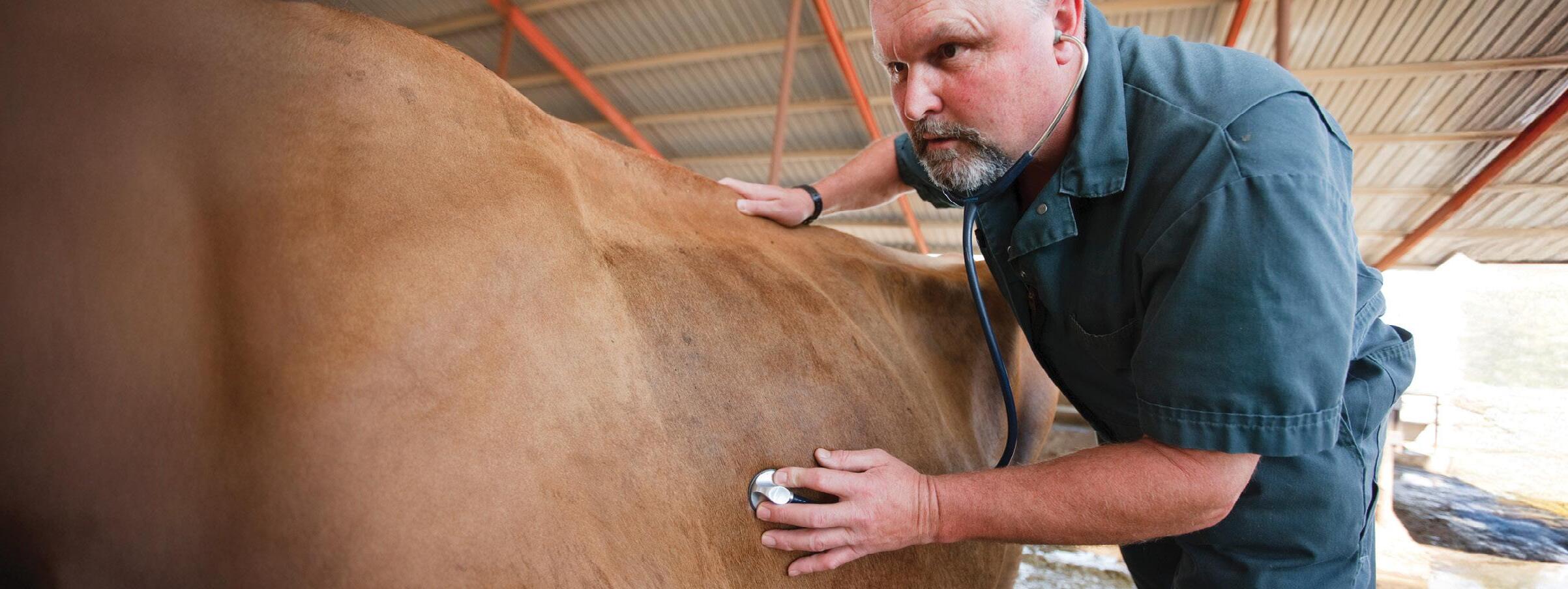
The
FARM Antibiotic Stewardship program
area serves as an integral part of ensuring prudent and responsible use of antibiotics on farms.
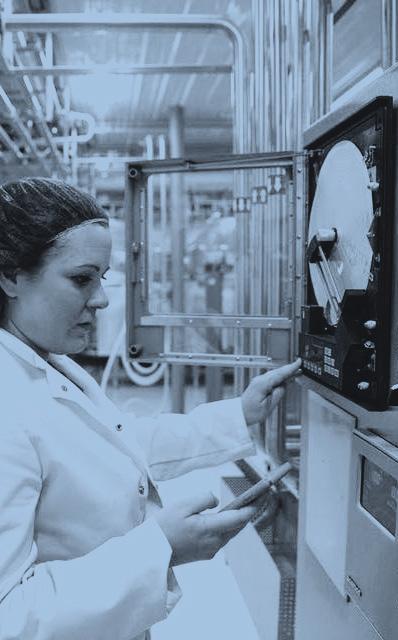
Producers have access to resources that encourage proper use of antibiotics and other treatments used for dairy cattle.
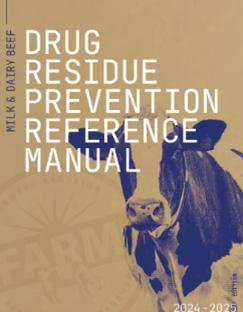
The latest version of FARM’s Milk & Dairy Beef Drug Residue Prevention Manual was released in June. The manual and accompanying pocket guide are the primary educational tools for farmers, their employees and their veterinarians. They serve as a quick resource to review antibiotics approved for dairy cattle and as educational tools for farm managers developing best management practices necessary to avoid milk and meat residues. Other available resources include fillable templates for recording treatments and vaccination logs.
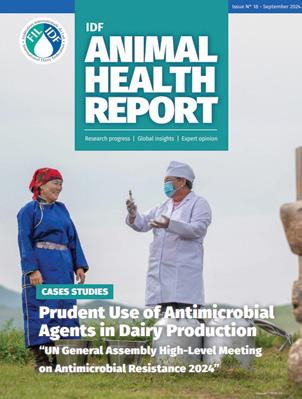
FARM’s Antibiotic Stewardship program lead, Dr. Jamie Jonker, sits on the International Dairy Federation Science Program Coordinating Committee and played a role in representing dairy during the United Nations High Level Meeting on Antimicrobial Resistance (AMR) in September. IDF also launched its 2024 Animal Health Report, centering on AMR and highlighting the federation's on-going participation in UN AMR meetings. The IDF Animal Health Report focuses on case studies, research and actions that dairy farmers and other relevant allies around the world are taking to address AMR with a One Health framework. Articles in the report demonstrate actionable information for the global dairy sector to accelerate progress on AMR control.
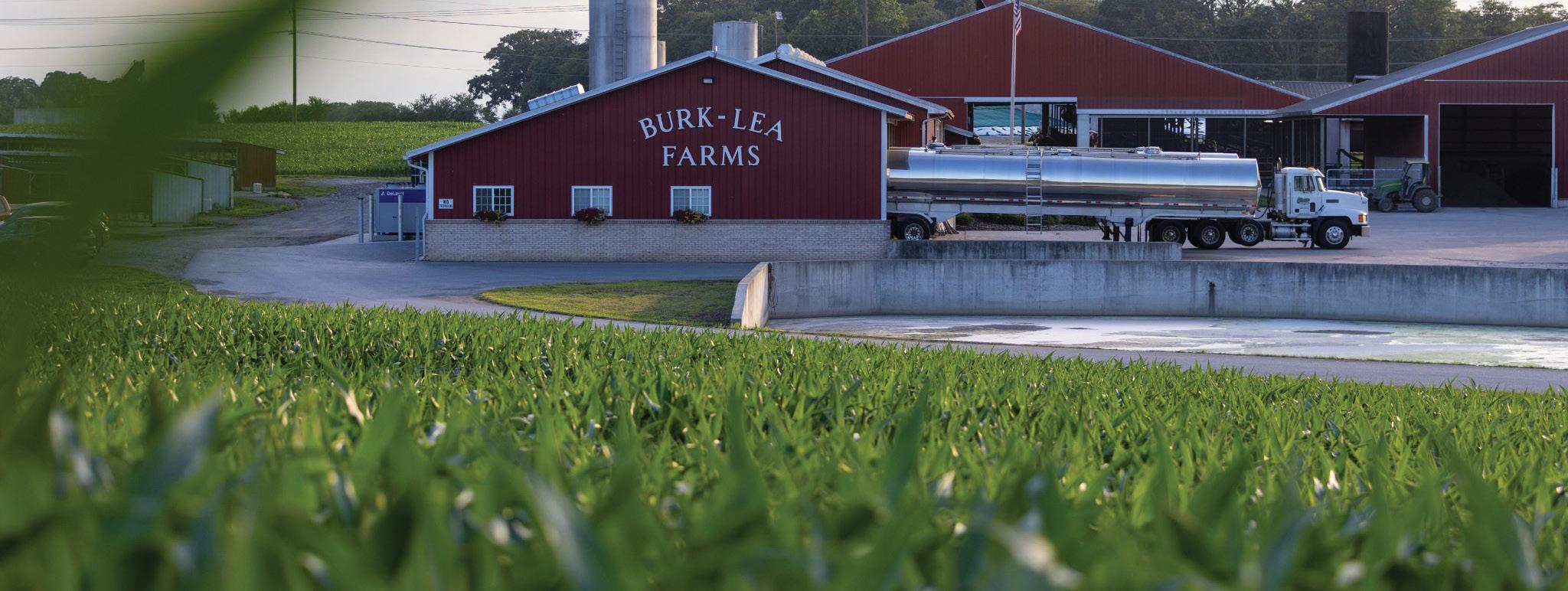
FARM Biosecurity provides dairy farmers with tools to keep their cattle and dairy businesses safe from the unseen threat of disease.

Supported through a cooperative agreement with USDA, FARM Biosecurity equips producers with resources to develop both “everyday” and “enhanced” biosecurity plans.
The program proved essential in helping guide dairy farmers through a real-time biosecurity threat: the presence of H5N1 virus in dairy cattle. FARM provided producers with timely, accurate information and industry-leading resources as the first cases of H5N1 appeared.
At the world’s largest dairy event, World Dairy Expo, FARM held an informational panel session on H5N1 exclusive insights moderated by Uplevel Dairy’s Peggy Coffeen. Dr. Jason Lombard of Colorado State University and Dr. Keith Poulson of the Wisconsin Veterinary Diagnostic Lab gave status reports on the ongoing outbreak. Miquela Hanselman, who leads the FARM Program’s biosecurity efforts, shared biosecurity steps producers can take to mitigate transmission risk and Michigan dairy farmer Brent Wilson reflected on having H5N1 in his herd and the lessons he took
FARM provided producers with timely, accurate information and industryleading resources as the first cases of H5N1 appeared.
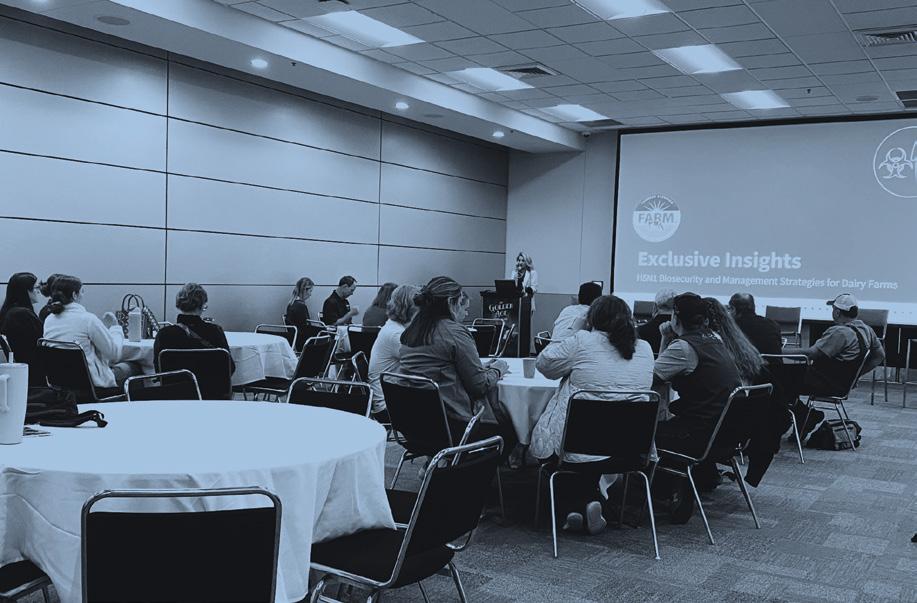
away from it. California producer Brian Pacheco also discussed strategies he has employed to protect his herd from the outbreak in his region.
NMPF secured a second USDA National Animal Disease Preparedness and Response Program (NADPRP) cooperative agreement to further develop the FARM Biosecurity pillar. This cooperative agreement, which runs through 2026, will include developing two in-person enhanced biosecurity trainings, additional online biosecurity training modules and resources, and updating the Secure Milk Supply program materials.
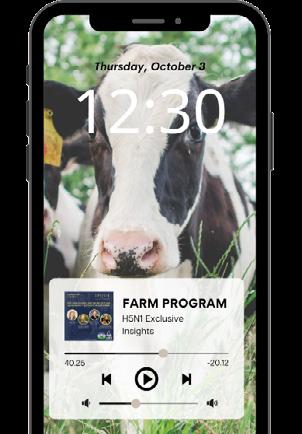
The FARM Program partnered with Uplevel Podcast’s Peggy Coffeen for a conversation with dairy farmers and experts on H5N1 during the 2024 World Dairy Expo.
For more information, please visit www.youtube.com/watch?v=5SIgZVmUtBg
At the world’s largest dairy event, World Dairy Expo, FARM held an informational panel session on H5N1 exclusive insights.
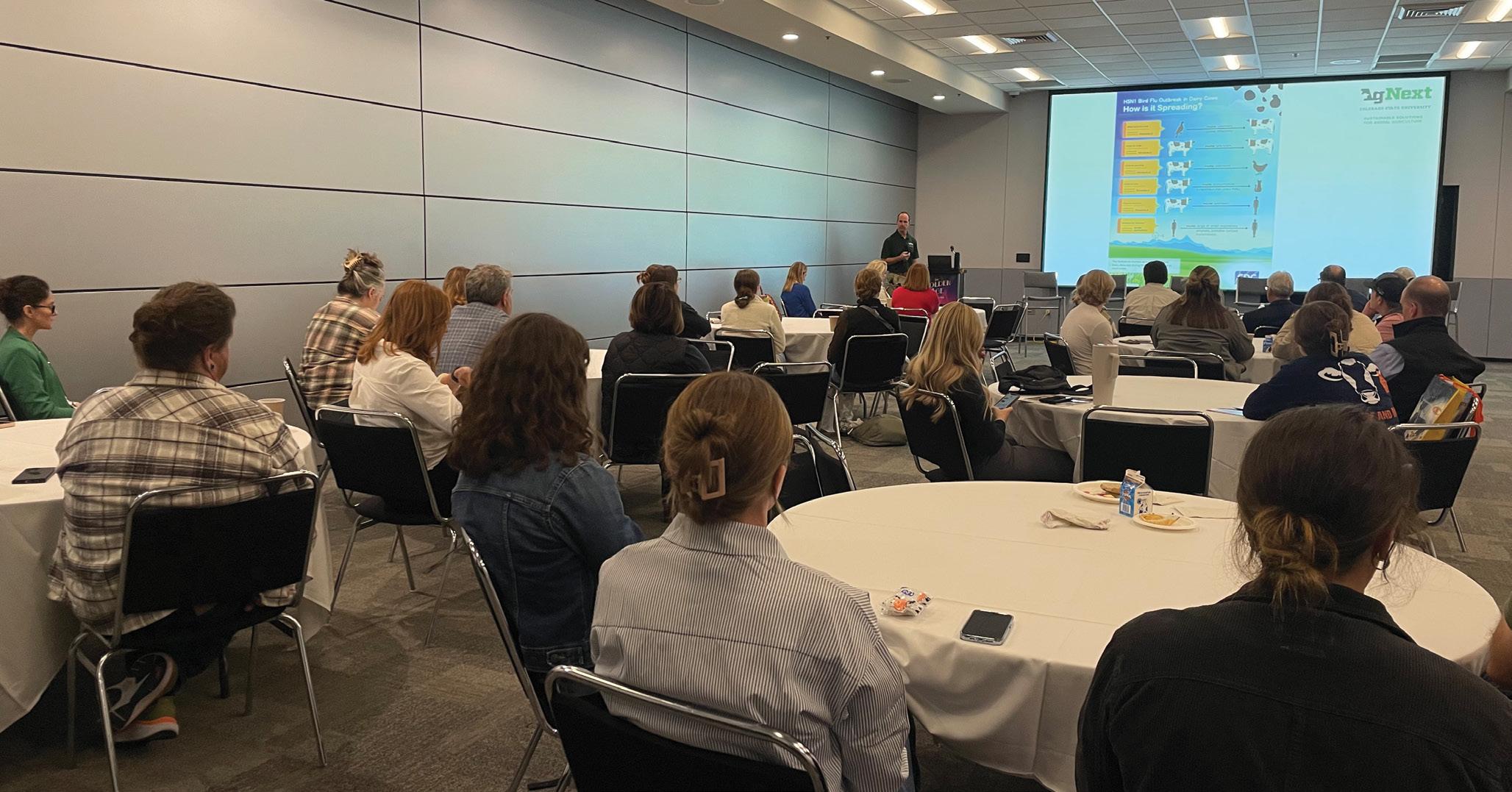
2024 FARM EXCELLENCE AWARD WINNER
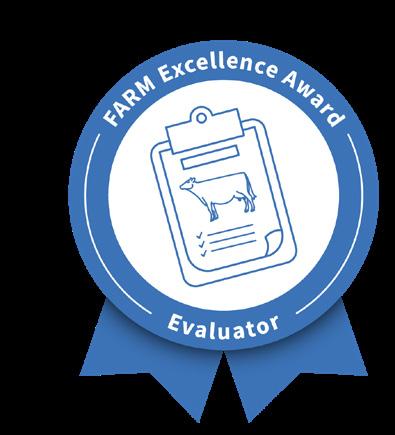
Since starting with First District in May 2021, Nicole Frank has conducted more than 500 FARM Animal Care evaluations and 70 Environmental Stewardship assessments. She works diligently to ensure her farms are prepared for every FARM evaluation through ongoing support, assistance and striving for shared continuous improvement.
Nicole has been a dairy advocate her entire life. She grew up visiting her grandparents’ dairy farm, showing dairy cattle in 4-H and serving as a local dairy princess. Nicole has truly embedded herself in serving the dairy industry through her role as a FARM evaluator.
During FARM Environmental Stewardship Version 3 development, Nicole took the initiative to take part in model testing. She also made it her mission to personally meet with veterinary clinics who service
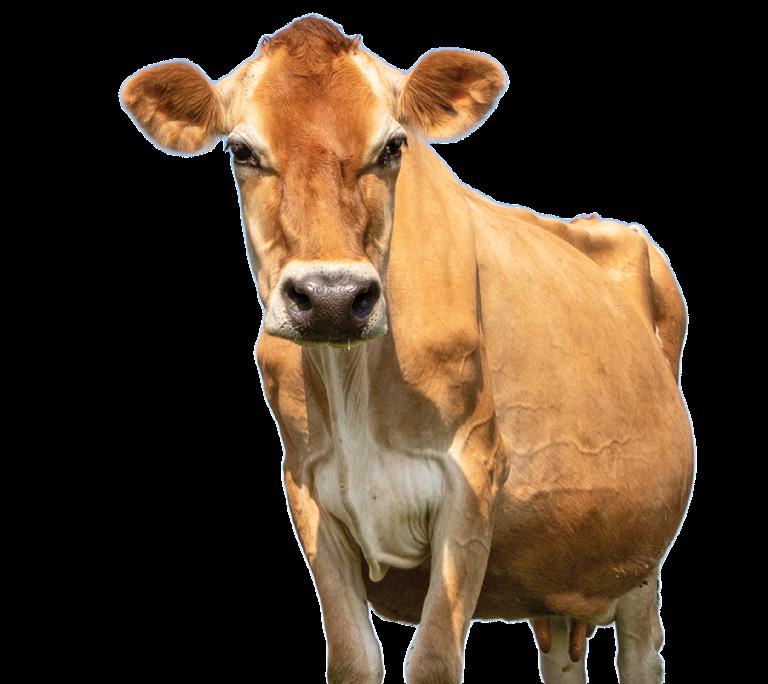
member-owners along with Minnesota Department of Agriculture dairy inspectors to answer questions about the FARM Program and gain support when working with farmers. She has gone the extra mile, being an advocate and influencer on the FARM Program and its importance to industry professionals.
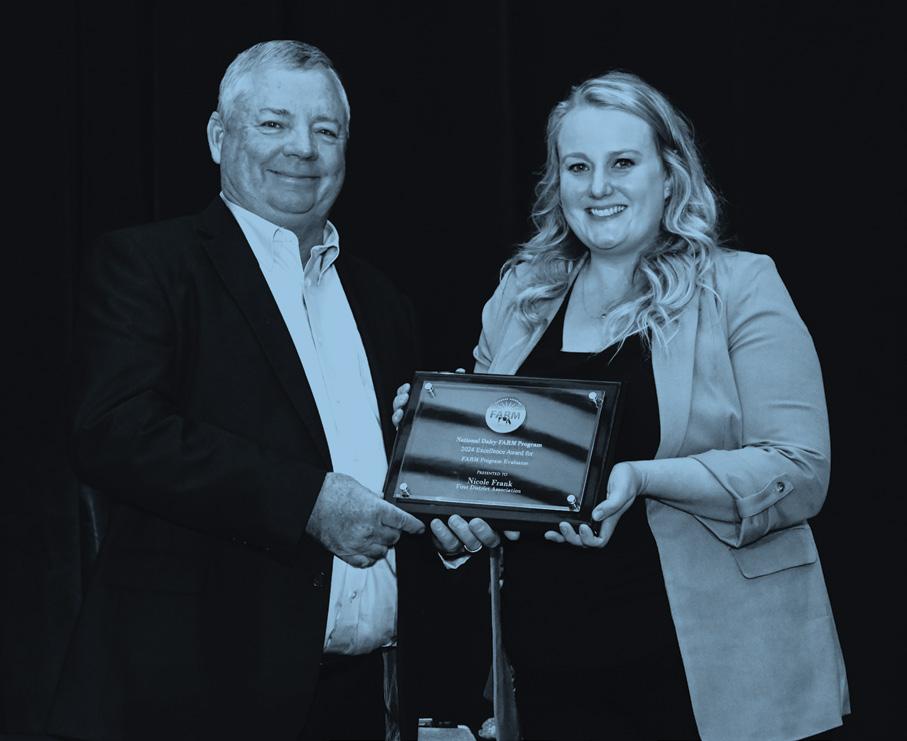
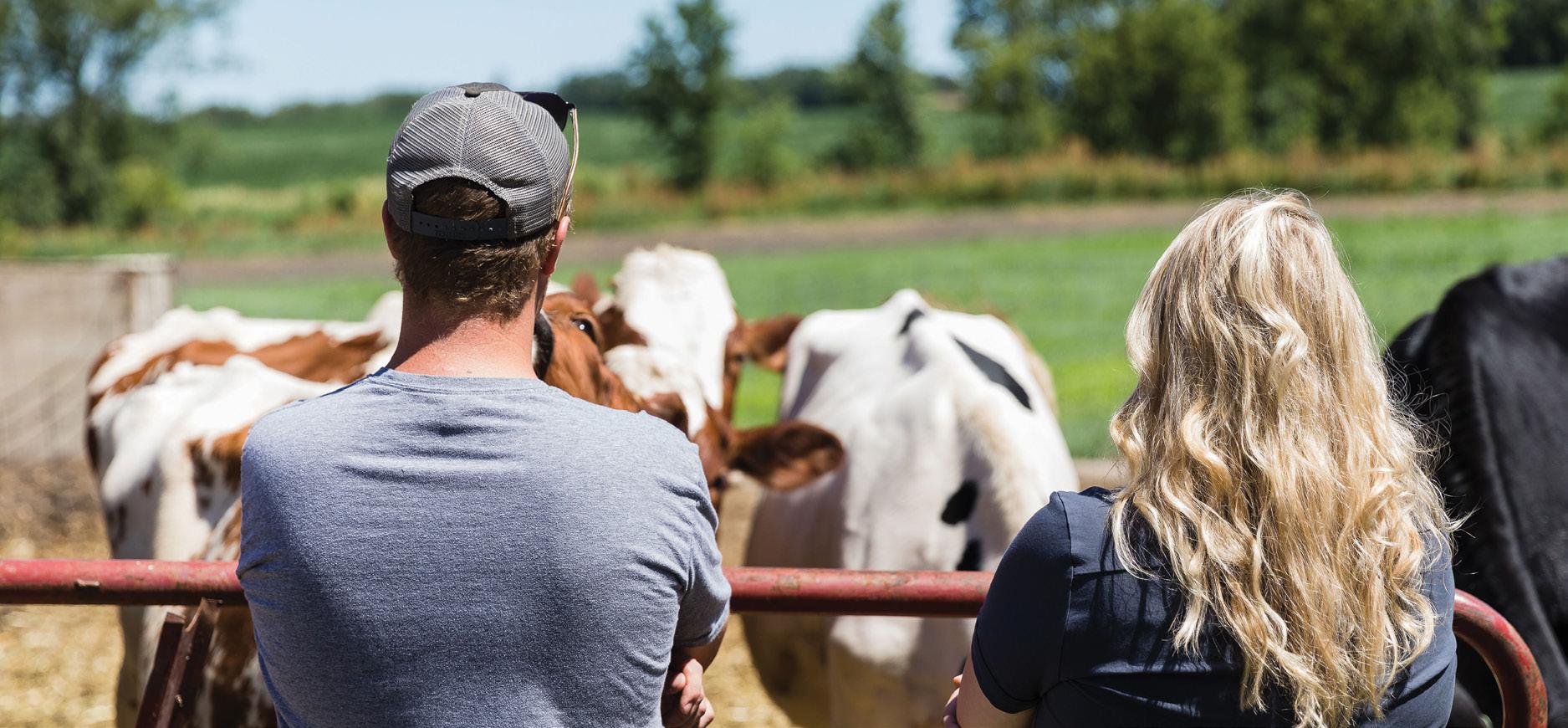

Farmers are the original environmental stewards; the FARM Environmental Stewardship Program helps tell that story.
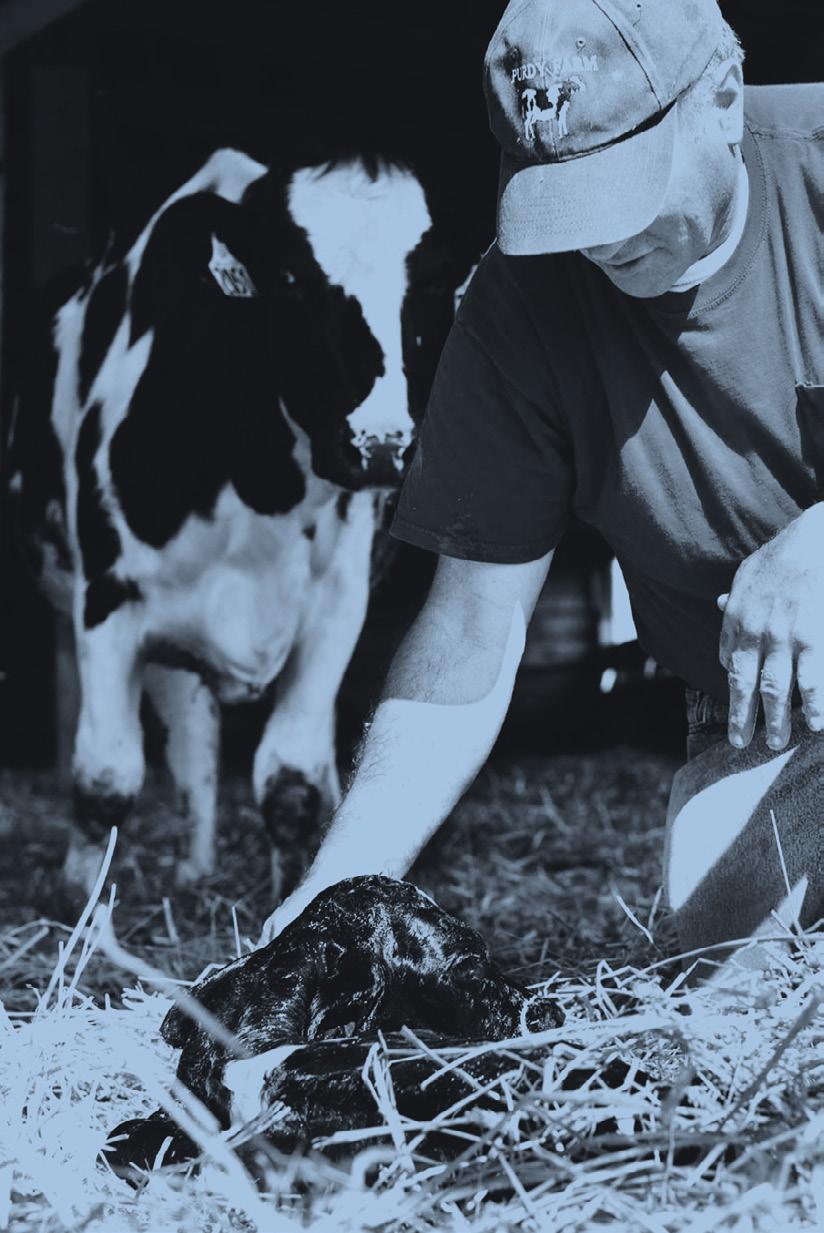
The evaluation tool offers a comprehensive estimate of greenhouse gas emissions and energy use on dairy farms to help producers track advances in dairy production efficiency. FARM Environmental Stewardship also provides educational materials for farmers to understand and improve their footprint. The accompanying suite of resources help dairy producers identify opportunities to increase farm sustainability and identify areas for improved efficiency.
FARM Environmental Stewardship Version 3 launched Oct. 31, using a new greenhouse gas (GHG) model that offers robust what-if scenarios so farmers can assess the impacts of potential practice or technology adoption. The tool equips farmers to make decisions that align with sustainability and economic goals for their farm. The Ruminant Farm Systems (RuFaS) model that powers FARM ES Version 3 is backed by robust science and led by researchers from across the country. The FARM Program facilitated real-world testing of the model to make sure the new platform meets the program's commitment to working for farms of all sizes, geographies and production styles.
The FARM Program facilitated real-world testing of the model to make sure the new platform meets the program’s commitment to working for farms of all sizes, geographies and production styles.
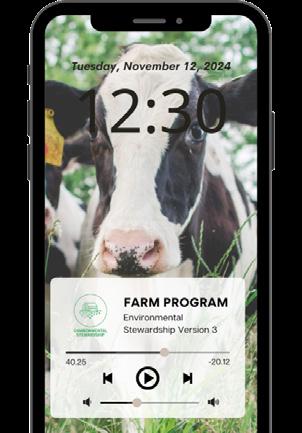
MIC’D UP
NMPF’s Chief Sustainability Officer
Nicole Ayache discussed FARM ES Version 3 on NMPF’s Dairy Defined, highlighting the benefits of the new RuFaS model and what that can mean for dairy farmers navigating the world of carbon credits.
For more information, please visit https://www.nmpf.org/new-farminitiative-advances-dairy-stewardship/
As in prior versions, the updated FARM ES is designed with U.S. dairy farmers in mind.
Active Evaluators 45 New Evaluators certified in 2024 BY THE NUMBERS
Version 2 Evaluations in 2024
As in prior versions, the updated FARM ES is designed with U.S. dairy farmers in mind; the minimum data inputs are ones most farms have on-hand. The tool also has optional data inputs, prefilled with defaults, that farmers can override with their farm’s data to provide more tailored results.
Improved data inputs include:
�� Ration information: expanded library of byproduct feeds, regional byproduct mixes and ability to specify use of methane-reducing feed additives
�� Redesigned manure section to better reflect how farmers consider manure management
New, optional data inputs include:
�� Ability to enter the farm’s cropping practices for more tailored results on emissions and carbon sequestration estimates
�� Details on reproductive management and culling information, which can influence the farm’s overall emissions
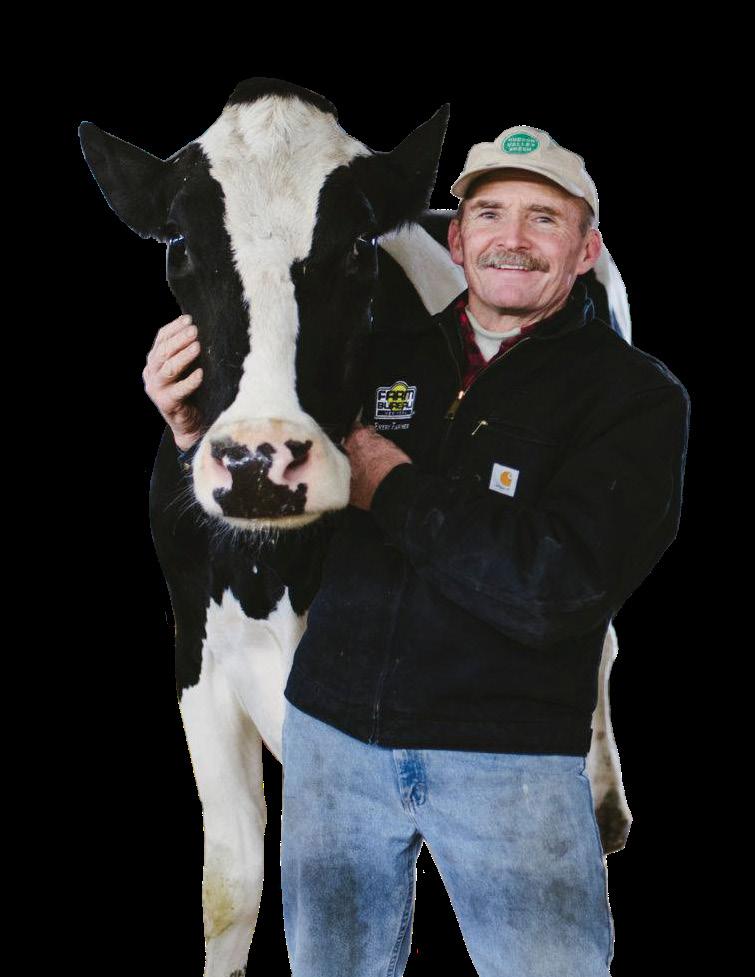
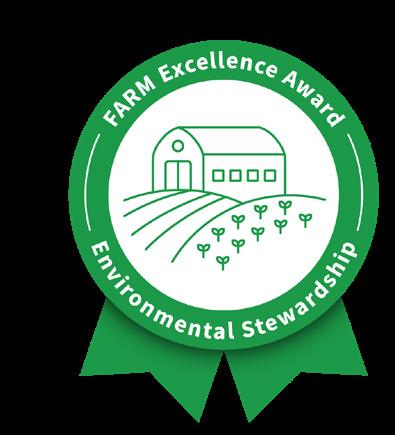
Double S Dairy was established 25 years ago by brothers Dan and Steve Smits in Markesan, WI.
Leadership at Double S Dairy extends beyond the Smits brothers with Butch Guenther, the farm’s dedicated herdsman, who has been a pivotal part of the team. The farm ships its milk to Saputo Cheese USA.
Today, the farm milks approximately 1,500 cows and manages its own crop production. The farm cultivates alfalfa and corn for silage, ensuring high-quality feed and reinforcing a circular system where crops are grown, fed to the cows, and manure is recycled back into the fields per its nutrient management plan, promoting sustainability and resource efficiency.
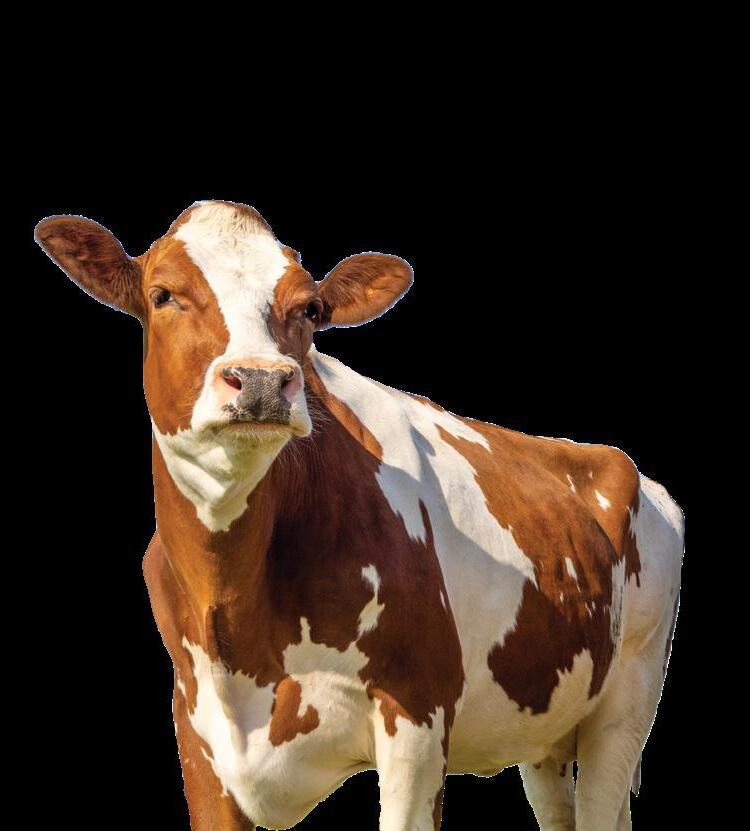
By leveraging the FARM Environmental Stewardship evaluation results and FARM resources, Double S Dairy has laid a strong foundation for sustainable growth and environmental stewardship. In 2023, the farm participated in a comprehensive farm assessment to establish its onfarm greenhouse gas and energy baselines through FARM ES Version 2. By sharing its knowledge and experiences, Double S Dairy supports the broader agricultural community in adopting sustainable practices.

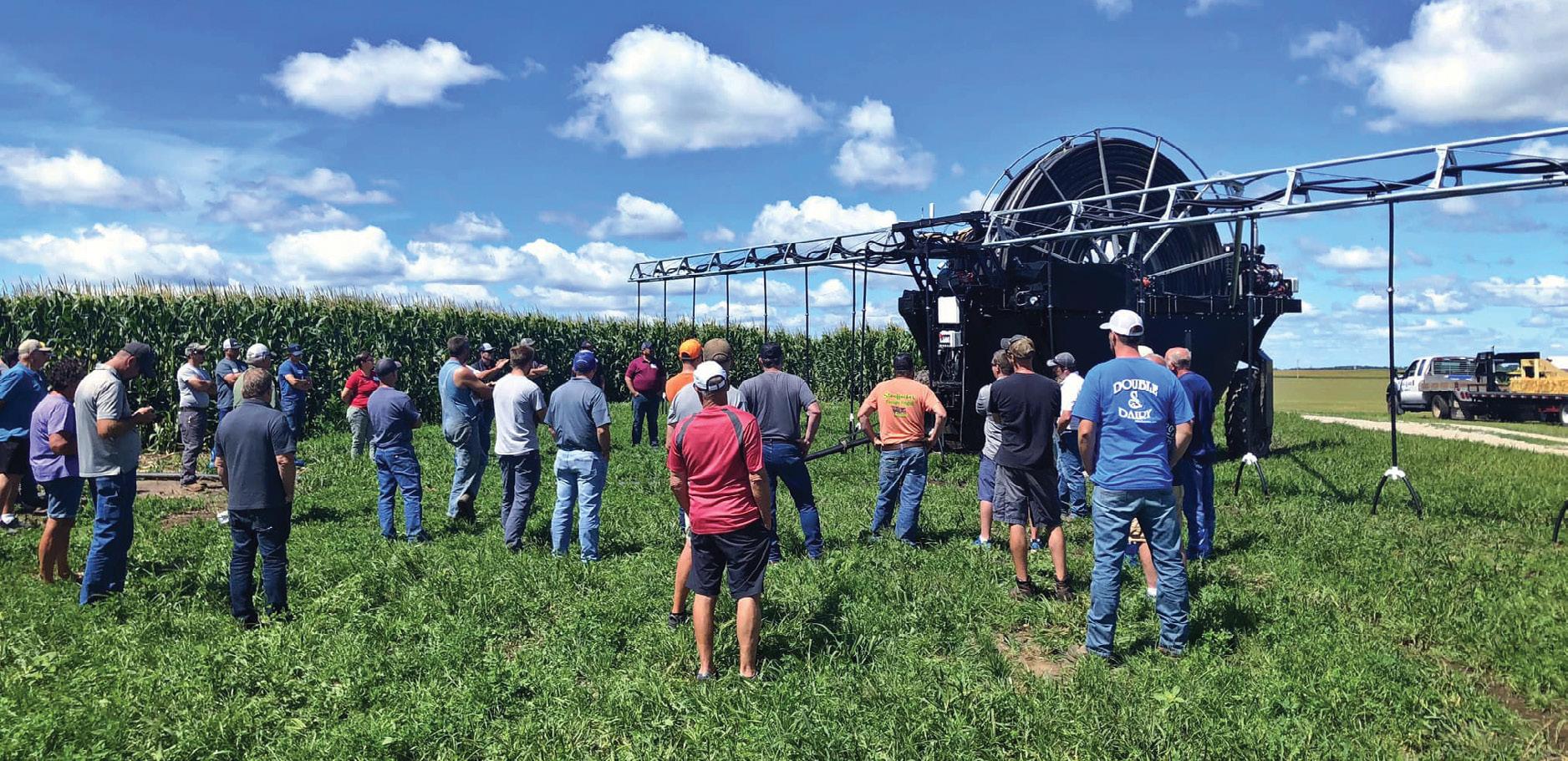
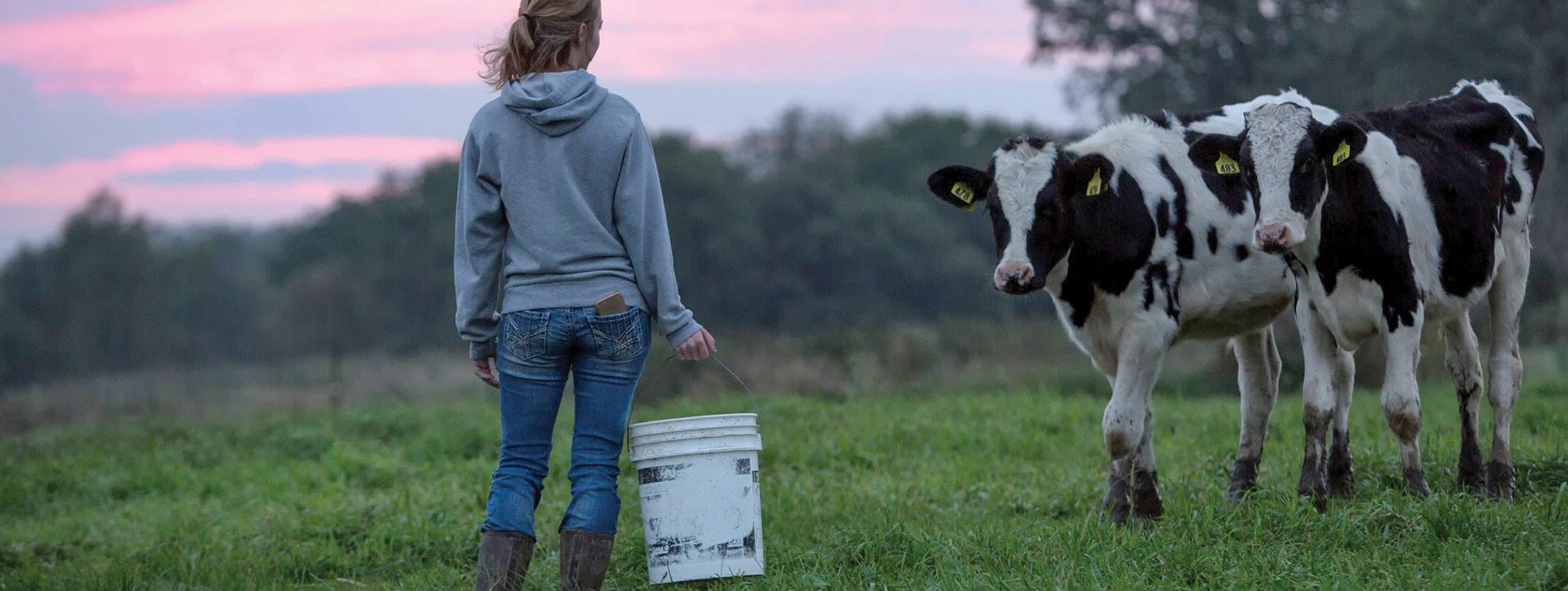
FARM Workforce
The program equips dairy farm owners and managers with tools to review and enhance their safe and thriving work environments.
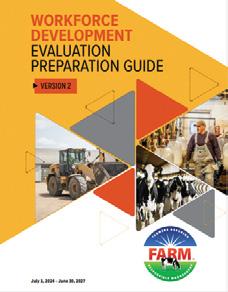
FARM Workforce Development
Version 2 debuted July 1, with updates focused on improving the evaluation tool used onfarm to assess human resource management and safety best practices. Seven questions were added to further strengthen the tool’s coverage of communication and performance management areas.
Evaluator training for Version 2 took place throughout the year in an on-line format, with subject matter experts speaking at each training session to build human resource and safety best practice knowledge.
BY THE NUMBERS
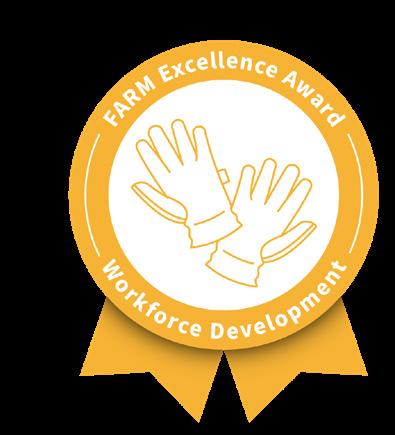
Oakridge Dairy has a deep history in Ellington, CT, founded in the late 1890s. The farm is a member of Dairy Farmers of America. The Oakridge herd has 2,550 cows milking on average with approximately 50 employees keeping things running—from feeding calves to payroll. Oakridge has a very clear vision to be the farm of the future, and a place where consumers know their farmer.
Oakridge has used the FARM Workforce Development resources and evaluation to support continuous improvement by adding to its detailed employee handbook and implementing safety trainings through company-wide monthly meetings. Over the past twelve months, the farm conducted training sessions covering 13 different topics for daily operations on
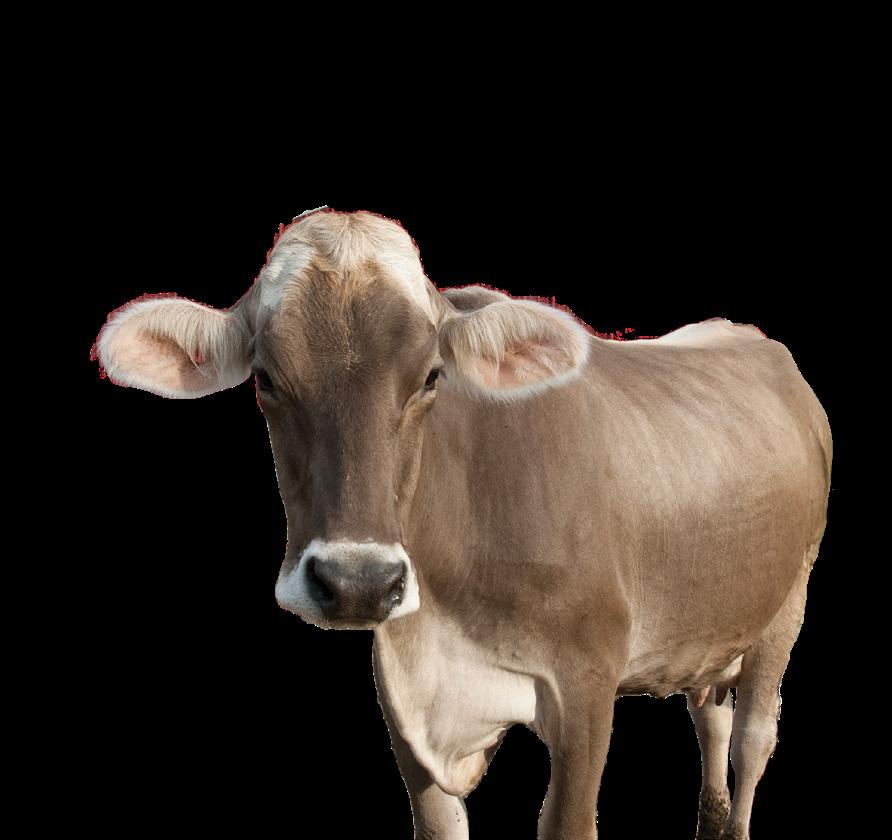
the farm. Regular training assures employee safety and contributes to the farm’s overall success.
Oakridge knows its employees are the core of the dairy and work to make sure they are supported outside of work too, such as hosting an employeeorganized soccer team. Its mission is to build a better future for families by producing safe and healthy food while delivering value to employees, owners and its community.
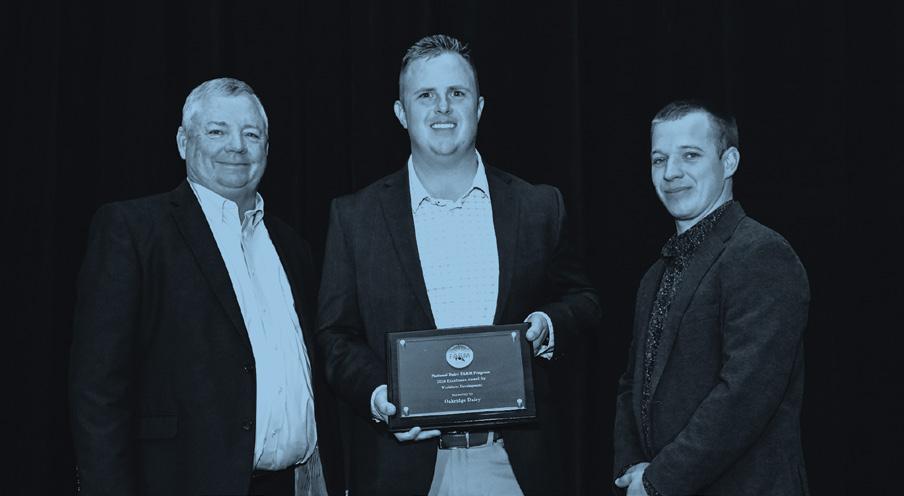
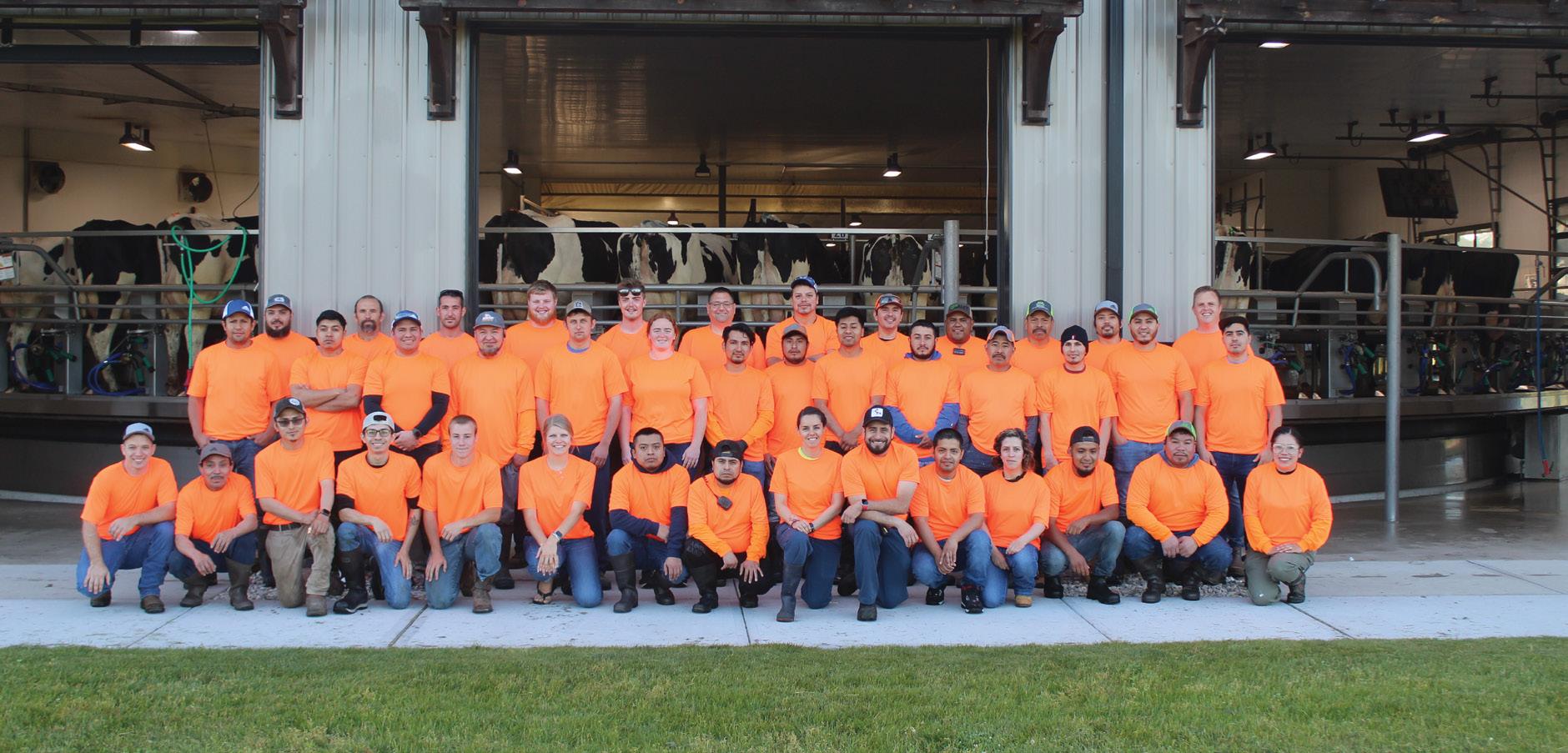
Agri-Mark
Agropur, Inc. USA
Albertson’s
Alexandre Family Farm
Appalachian Dairy
Farmers Cooperative
Arla Foods
Arps Dairy, Inc.
Associated Milk Producers, Inc.
Aurora Organic Dairy
Beecher’s Handmade Cheese LLC
BelGioioso Cheese, Inc.
Bongards Creameries
Boonville Farms Co-op
Borden Dairy Company
Brewster Cheese Company
Burnett Dairy Cooperative
Byrne Dairy, Inc.
California Dairies, Inc.
Carr Valley Cheese Company
Cascade Cheese
Cayuga Marketing
Cedar Valley Cheese
Central Equity
Milk Co-op
Chalet Cheese Cooperative
ClarCo Farmers Co-op
Clover Farms Dairy Company LLC
Cloverland Farms Dairy
Cobblestone Milk Cooperative
Con Agra Brands
Cooperative Milk Producers Association
CROPP Cooperative/ Organic Valley
Dairy Farmers of America
Danone North America
Decatur Swiss Cheese Cooperative
Eau Galle Cheese Factory LLC
Elba Co-op Creamery
Ellsworth Cooperative Creamery
Erie Cooperative Association
Farmers Cheese Cooperative Association
FarmFirst Dairy Cooperative
Finger Lakes Milk Co-op
First Choice Dairy Care
First District Association
Foremost Farms USA
Foster Farms (Crystal Creamery & Humboldt Creamery)
Galliker Dairy Company
Glanbia Nutritionals
Gossner Foods, Inc.
Grande Cheese
Grant Farmers’ Cooperative
Grassland Dairy Products, Inc.
Great Lakes Milk Producers
Great Plains Dairy Association
Green Acres Dairy Cooperative
Guggisberg Cheese, Inc.
Harmony Milk Producers
Cooperative
Harrisburg Dairies, Inc.
Hein - Ellen Hettinga Dairy Farms
High Desert Milk
Hilmar Cheese Company
Holland Patent Farmers Co-op
Homstead Creamery, Inc.
Horizon Organic Dairy LLC
Idaho Milk Products

Innovative Food Solutions (Gibby Group)
Jefferson Bulk Milk Co-op, Inc.
Joseph Gallo Farms
Kalona Farms
Klondike Cheese Co.
KYTN Cooperative Association LLC
Lactalis American Group
Lactalis US Yogurt, Inc. (Stonyfield Farms, Inc.)
Lafayette Dairies
LaGrander’s Hillside Dairy
Lake Country Dairy
Lanco Pennland
Land O’Lakes, Inc.
Leprino Foods
Liberty Milk Producers, Inc.
Lone Star Milk Producers
Lowville Producers Dairy Cooperative
Lynn Dairy, Inc.
Magic Valley Quality Milk Producers
Maryland & Virginia Milk Producers Cooperative
Michigan Milk Producers Association
Middlebury Co-op
Minerva Dairy, Inc.
Mullins Cheese, Inc.
Nasonville Dairy
National Farmers Organization (NFO)
Natural Dairy Products
Nebraska Milk Producers
Non-Stock Cooperative
Nestle USA
North Mountain Farms LLC
Northwest Dairy Association
Oak Grove Dairy, Inc.
Old Country Farms Co-op
Oneida-Madison Milk Producers Co-op
Organic West Milk, Inc.
Pacific Gold Milk Producers
Pearl Valley Cheese
Pioneer Milk Producers Cooperative
Plainview Milk Products Cooperative
Prairie Farms Dairy, Inc.
Preble Milk Co-op Association, Inc.
Producer’s Cooperative, Inc.
Riverview LLP
Rolling Hills Dairy Producer Cooperative
Rutter’s Dairy, Inc.
Saputo Cheese USA
Sargento Cheese, Inc.
Sartori Company
Scenic Central Milk Producers Cooperative
Schneider’s Dairy, Inc.
Select Milk Producers, Inc.
SmithFoods, Inc.
Snake River Dairyman’s Association
Southeast Milk, Inc.
Steamburg Milk Producers Cooperative
Stewart’s Processing Corporation
Tillamook County Creamery Association
Toft Dairy
Turner Dairy Farms, Inc.
United Ag Services
United Dairy, Inc.
United Dairymen of Arizona
Upstate Niagara Cooperative, Inc.
US Milk LLC
Valley Queen Cheese Factory, Inc.
V&V Supremo Foods, Inc.
Wapsie Valley Creamery, Inc.
Westby Cooperative Creamery
Western Organic Family Farms Cooperative
Weyauwega Star Dairy, Inc.
White Eagle Cooperative
Widmer’s Cheese Cellars, Inc.
Zimmerman Cheese, Inc.
LEGEND
Animal Care
Participants
Environmental Stewardship
Participants
Workforce
Development
Participants
National Milk Producers Federation Members

